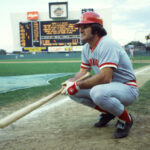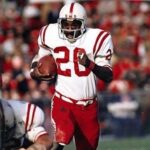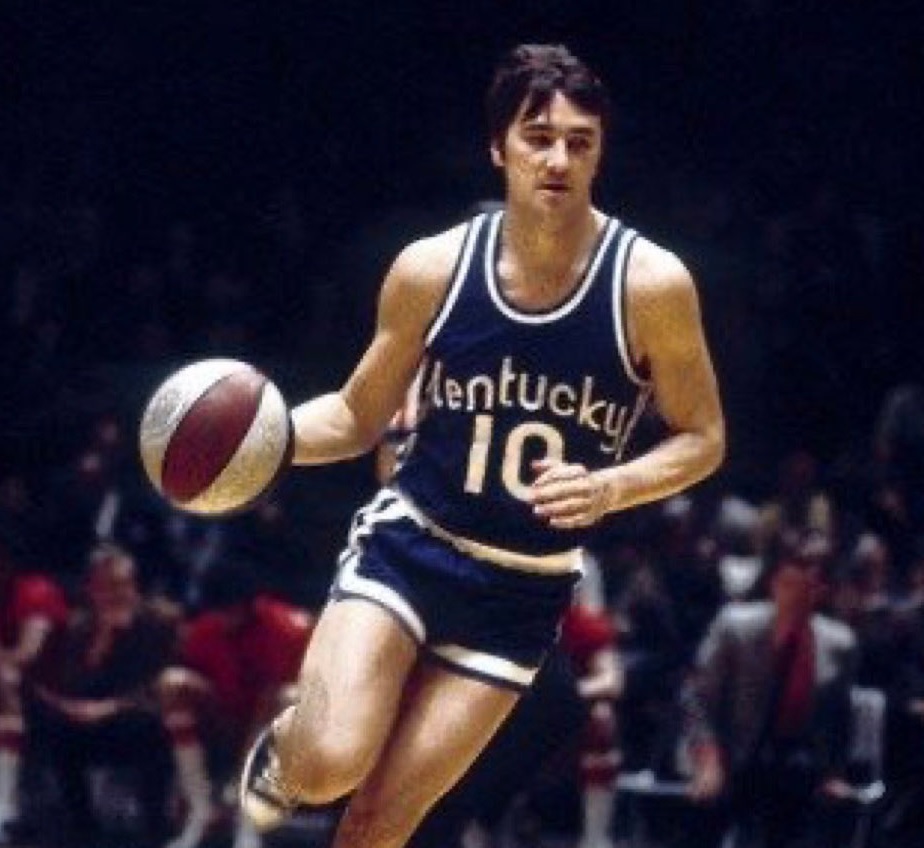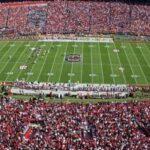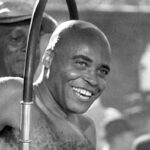Through The Eyes of Karl Mecklenburg: To The Heart of the Student Athlete
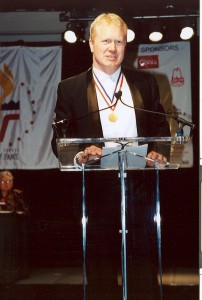
Karl Mecklenburg at induction ceremony for Colorado Hall of Fame
The following is part of a weekly series called “Through the Eyes Of…” In each segment, I share interviews with or stories about those that I view to be the “good guys.” “Through the Eyes of…” is a part of my personal crusade to present sports in all its beauty, splendor, and goodness, instead of through hashing and rehashing all that is broken with our national treasures.
I recently became acquainted with Karl Mecklenburg after being asked by his publicist, Julie Schoerke, to do a book review on Mecklenburg’s new book, “Heart of a Student Athlete: All Pro Advice for Competitors and Their Families”.
I hesitated at first for a number of reasons. Aside from the book having the longest name to ever appear in the Dewey Decimal System, Mecklenburg gave my New England Patriots fits every time they ventured into Mile High. Why would I want to help the enemy promote his book?
Also, I confess that I’m not much of a reader and have truly struggled through my previous attempts to become sports literature’s version of Siskel and Roeper. Amazing that someone can pretend to be so learned and have hardly cracked a book since college at Syracuse circa 1983. If a book doesn’t grab my interest in about the first five pages it becomes a door stop.
And lastly, my daddy always taught me that if I don’t have anything nice to say about something, don’t say anything at all. That philosophy makes for a rather lopsided review, as you can imagine, and has led to abstaining from reviews rather than refraining from spewing anything at all should the book not be enjoyable.
But, the truth of the matter is, I get excited rubbing elbows with the guys who donned the uni (not to mention that Karl could bench press me if he chose to) so I figured I’d give Karl, Julie, and the book the benefit of the doubt.
Well, as I hope you saw in my very honest review of the book in yesterday’s Bleacher Report, the book had me at “Hello” and didn’t drop me off until “The End.” Proud of myself for finishing any book thicker than Sports Illustrated, I called on Karl, who was gracious enough to follow up with a brief Q and A.
As I always mention in this series, Karl is one of the good guys in sports and therefore is the subject of my latest “Through the Eyes Of…”
Civ: As a parent, what do you suggest if your student athlete wants to quit their sport?
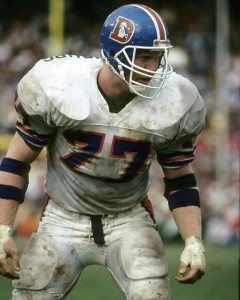
Mecklenburg was considered by some to be "too slow, too small and too stiff" to play in the NFL
Karl: I have supported my children in their decisions to walk away, as long as it’s between seasons. During a season the coaches and other players are counting on your child to be a team member. Eventually we all walk away from playing our sport. I just waited until I was 34 years old. That said, I believe that kids need to be involved in some sort of team activity whether it’s sports, scouts, music, theater; something to teach them the nuts and bolts of teamwork and leadership.
Civ: Do you think this creates a pattern for life choices?
Karl: I know that when a child is given the opportunity to make decisions about which activities to participate in, they will value those activities. This is how they learn to make decisions that are appropriate for them before they become adults.
Civ: Who was the best coach you had and how did that coach impact your life?
Karl: I had many great coaches through the years, but my Augustana College defensive line coach Richard Peterson (Pastor Pete) impacted my life beyond just football. His combination of football toughness and uncompromising Christianity is an example I have tried to live up to.
Civ: Which player that you played with had the biggest impact on your team? Was that the person with the greatest talent?
Karl: The most dominant football player that I ever played with was a kid named Duane Anderson. He was a man among boys in the ninth grade and we rode his back to the Twin Cities Championship. That was his last season of football because his family needed him to work at the family gas station. Without opportunity, without desire, without courage, without dedication, without teamwork, without honesty and forgiveness, talent is worthless.
Civ: Tell me what it was like to play for Coach Dan Reeves.
Karl: Dan was an offensive head coach, so I didn’t deal with him in the X’s and O’s of the game, but his passion set the tone for the entire team. He wanted to win more than anyone I have ever met. His drive to win pushed us beyond what anyone expected those teams to accomplish.
Civ: You missed the majority of your Super Bowl appearance in 1989 due to a leg injury. Can you tell us how it happened and how you deal emotionally with something like this?
Karl: Injuries are tough to deal with, but especially when you are intentionally injured. I was leg whipped in the Super Bowl playing against the 49ers and tore cartilage in both of my knees. To work as hard as you have to work to get to the Super Bowl and have the chance to play taken away like that was devastating. Success is overcoming obstacles on the way to your dreams. I had offseason surgery, rehabbed both knees, and played my heart out pursuing the Super Bowl for five more years.
Civ: You speak quite candidly about players who used steroids and cocaine while playing, what do you say to an athlete who chooses to play using drugs?
Karl: Stop! You are risking your life for something that is a crutch and a foolish shortcut to a place you can get anyway. You will never know what you could have accomplished clean.
Civ: You specifically mention fellow Bronco Bill Romanowski and his steroid use. Do you have a relationship with Bill and do you think he will be surprised that he is directly mentioned in your book?
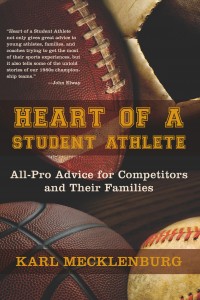
Heart of a Student Athlete is full of advice for the parent and the student athlete.
Karl: I played against Bill and have met him at Bronco functions. He has admitted steroid use and regrets not knowing if he could have made it with out them. He may be surprised, but I feel strongly enough about warning young athletes of the unnecessary dangers and negative side of steroid use that I needed to use concrete examples.
Civ: What do you suggest to a parent whose student athlete puts athletics before study?
Karl: It doesn’t matter how big or fast or strong an athlete is, if he doesn’t know where he’s going, he can’t get there. The best place to learn how to learn is in school. Insist on effort in school. Dedication is hard work, constant learning, and refusing to quit. Unless an athlete is dedicated, he cannot be successful.
Civ: You have created the six keys to success being teamwork, courage, honesty/forgiveness, dedication, desire, and goal setting. Are these keys that you had followed throughout your career or created specifically for the book? You present them in a random order, but do you feel one is more important or needs to be developed before the others?
Karl: These are universal, unchanging keys to success. As a motivational speaker, I have examined my life and the lives of other successful people and developed this list. The keys are interrelated and interdependent, meaning you can’t chose three of them and be halfway successful. You need all six. I can’t identify one as more important than the others. They work together. It’s hard to write about one without mentioning others.
Civ: What made you decide to write a book? What do you hope to accomplish in writing it?
Karl: My desire as a speaker is to inspire long term positive change in teams and individuals. As a keynote speaker, the long term piece of that desire has always been a challenge. I decided to put my stories down on paper so people who had heard me speak could refer back to them and so I could impact people who hadn’t heard me speak.
I chose to direct the book at student athletes and their families because I have been asked so many times through the years about what it takes to make it to the next level in sports. As a parent, coach, professional athlete, and professional motivator, I saw a need to answer those questions.
Civ: The book speaks in detail about the many challenges you faced, especially in your college career. Why didn’t you give up and become a student only? How do you differ from those who give up?
Karl: My parents allowed me to make decisions about my extra curricular activities and supported my love of football. Each time I ran into a challenge, I was given the opportunity to decide if I wanted to go on or not. These decision making opportunities cemented my determination. By the time I got to the NFL, I had developed a desire to be the best player that ever played. I wasn’t going quit until someone made me go home or until it wasn’t fun for me anymore.
Civ: Who is the best teammate you ever played with; the guy who personifies team and why?
Karl: John Elway is a great example of a team player. As a superstar, he didn’t really need to do all the team-related activities that he participated in. He was at every team function and every offseason workout, weightlifting and running with the rest of the team.
John spent the time and made the effort to get to know everyone on the team. He went so far as to sit at a different lunch table every day so he could make sure he was connected to each of us. He put the team passion to win the Super Bowl first. His clear and consistent commitment to the team goal rather than his own statistics was a great example of leadership.
To Purchase or Win a Signed Copy…
“Heart of a Student Athlete: All Pro Advice For Competitors and Their Families” is available through Mecklenburg’s website at www.studentathlete.us or through your local Independent Bookstore, Barnes and Noble, Borders, or Walden Books.
We will be giving away a signed copy to a Sports Then and Now reader by visiting the guest book on the site.
Mention Sports Then and Now and sign up at the site to be entered to win an autographed copy of the book.
To Learn More about Karl Mecklenburg’s REACH Foundation…
The goal Karl Mecklenburg’s REACH (Rewarding Experiences for All Children) Foundation is to provide Denver area children and youth with educational opportunities and resources needed to excel in the classroom and in life. The Foundation’s interactive programs and events are designed to help build a strong foundation through education and outdoor experiences.
Todd Civin is a freelance writer for Bleacher Report, Seamheads and Sports Then and Now and can be reached at toddcivin1@aim.com for hire or comment. Civin is also a supporter of A Glove of Their Own, the award winning children’s book that teaches paying it forward through baseball.


